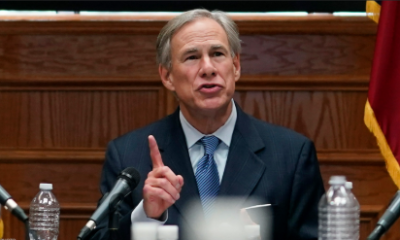Comments and Issues
Why Obamacare survived
Published
9 years agoon
By
Olu Emmanuel
Since the United States’ Affordable Care Act (ACA) – or “Obamacare” – was enacted in 2010, Republicans have been promising to “repeal and replace” it. When the 2016 presidential and congressional elections delivered all three branches of the US government to the party, the time to fulfill that promise seemed to have arrived. Yet the anti-Obamacare crusade has just been dealt a crushing blow, owing to the refusal of some Republican senators to vote for the replacement legislation.
Republicans blame their failure on the Democrats’ refusal to cooperate. But why should the Democrats help to dismantle their biggest legislative achievement of the last decade (if not longer)? The major flaws in Obamacare are not, as has been argued, unintended consequences of a poorly designed policy, which thus must be replaced; instead, they stem from Republican demands.
Of course, there are Republicans who acknowledge the facts. Some support repeal and replace anyway: Senator Rand Paul of Kentucky, for example, is a relatively consistent libertarian who believes that the benefits of minimizing the government’s role in health care somehow outweigh the costs to lower- and middle-income working Americans. Others recognize that the costs are unacceptable – indeed, that is why the Republican-proposed replacement has just been rejected – but have been unable to put forward any credible alternative.
Logically, there should be a third group of moderate Republicans who acknowledge the arithmetic, find it unacceptable, and commit either to reforming Obamacare or developing some other realistic plan that can deliver better health insurance to more Americans. Unfortunately, there is nobody left in this category, except perhaps Senator Susan Collins of Maine.
ALSO SEE: The Protocols of Donald J. Trump
But there is another, deeper reason why the Republicans cannot come up with an alternative to Obamacare: the ACA is based firmly on their own ideas. For example, the individual mandate that they now decry was originally developed by conservative think tanks seeking to devise a workable system of national health insurance with the smallest possible role for the government. It was the centerpiece of Massachusetts’ health-care reform signed by Mitt Romney in 2006, when he was the state’s governor.
The individual mandate is essential to barring insurance companies from discriminating against those with pre-existing conditions – a provision that even Obamacare’s opponents want to keep. It is not financially feasible for private insurance companies to insure people who are already sick or at high risk, if those who are still healthy are not also in the pool.
This does not mean that the US needs to go to the extreme of a full-on socialized health-care system, whereby the government directly provides health care to all (though the British are certainly attached to their National Health Service). And, indeed, nobody in the US is calling for that.
What some – most vocally, Vermont Senator Bernie Sanders – have proposed is a single-payer system. In Canada, such a system of government insurance and private provision of services delivers strong health outcomes at a fraction of the cost of the US system. Yet, while a substantial share of Americans may support such a system, a single-payer program would face strong resistance from three powerful groups: the insurance industry, consumers who are happy with their current employer-paid plans, and Republicans in general.
But the system many Republicans tout – a scheme based fully on “personal responsibility” – is not feasible. The system the US had before Obamacare did not meet that standard, as the uninsured imposed costs not just on themselves, but also on other Americans. Those without insurance are more likely to experience conditions like obesity and addiction, and to let their health deteriorate before seeking medical attention. Before Obamacare, hospitals would simply pass the higher costs of treating them on to other patients.
The solution to America’s health-care woes lies somewhere between socialized medicine and laissez-faire. But there is no question that it must include something like the three legs of the Obamacare “stool”: the individual mandate, protection for those with pre-existing conditions, and a means to pay for it all. Though some Republicans pretend otherwise, there is simply no solution that decreases the role of government without increasing the ranks of the uninsured – and thus raising total health-care costs.
- Culled from Project Syndicate
You may like


Texas showdown: Governor Abbott sues to oust democrats as redistricting battle heats up


Democrats states sue Trump over birthright citizenship order


Trump leads Harris in New National Poll as election campaign intensifies


Isreal-Hamas War : Calls for calm against incitement to violence


Biden has declared war on conservative Christians


Trump’s last day in office, grants pardon to Steve Bannon, Lil Wayne, 71 others
Trending

 Football6 days ago
Football6 days agoNFF dismisses claims of DR Congo’s World Cup qualifying disqualification

 Entertainment5 days ago
Entertainment5 days agoSinger Simi sparks debate after calling for death penalty for rapists

 Football7 days ago
Football7 days agoCAF set for quarter-final draws in Cairo as road to continental finals takes shape

 Business4 days ago
Business4 days agoNaira mixed across markets as official window dips, parallel market strengthens

 Football7 days ago
Football7 days agoPardew praises Arteta’s four-competition charge, backs Liverpool for Champions League triumph

 Football5 days ago
Football5 days agoGalatasaray thrash Juventus 5–2 to hand Spalletti first champions League defeat

 Crime6 days ago
Crime6 days agoSouth African Court charges three over murder of Nigerian e-hailing driver in Pretoria

 Business4 days ago
Business4 days agoThree Crowns Milk launches nationwide Ramadan campaign to promote heart-healthy nourishment

